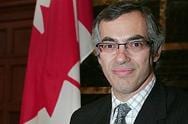Among gay activists, Tony Clement may be the most hated man in Stephen Harper’s cabinet. Now, in the middle of a federal election, Clement is fighting for his political life.
After unseating incumbent Liberal cabinet minister Andy Scott by just over two dozen votes — 21 after the first count and 28 after a recount — in 2006, Clement is battling it out in Parry Sound-Muskoka, a riding in which he owns a cottage.
Clement’s reputation in gay circles comes from several high-profile decisions he made as minister of health. There’s the prohibition on organ donation from sexually active gay men, there’s his contentious history with AIDS service organizations, and his opposition to Vancouver’s safe injection site.
But will national issues like Insite influence Clement’s electoral fortunes?
Perhaps not, according to his rivals for the rural Ontario seat.
“I haven’t actually had anybody raise it yet, to be honest,” says NDP candidate Jo-Anne Boulding, who supports Insite and calls it a program that is “admired around the world.”
“It’s not really an issue in the riding, I have to admit,” she continues. “[Voters] do tend to talk about the home community, rather than the more national issues like that.”
Liberal candidate Jamie McGarvey spoke at length about the benefits of Insite and said that since he was nominated by his party, people from outside the riding have been encouraging him.
“I’ve been surprised at the number of e-mails that I’ve had from people right across this country — especially from Vancouver — saying to me ‘You’ve got to beat this man and get him out of the political system because he’s doing more harm than good’,” he says.
McGarvey conceded, however, that national issues might not be the deciding factor in the riding. Both he and Boulding mentioned local concerns — primarily about unemployment — as likely to trump Clement’s performance as health minister.
Mark Townsend, the director of the Portland Hotel Society — an organization that administers Insite with the help of the Vancouver Coastal Health Authority — actually travelled to Parry Sound earlier this year and demonstrated outside of all of Clement’s constituency offices.
Townsend didn’t blame Clement for the decision to try and shut down Insite.
“This is purely a political issue, and I think it is Tony Clement jumping in front of Stephen Harper to take the bullet and make himself a lightning rod. That’s my naive analysis,” he says.
Apparently, one of Clement’s advisers told Townsend that Harper’s office was very active on the file.
“He told me that the Prime Minister’s Office interferes endlessly on this stuff — far more than it should be,” Townsend says, without identifying the staffer. “And he said to Tony Clement, you can’t be out there saying you’re not in favour of needle exchange. You’ve got to say that you’re in favour of some kind of harm reduction.”
When he arrived in Parry Sound with two other Downtown Eastside activists, Joey Only and Leah Martin, Townsend was nervous about the reception from the community.
“We just thought we would get a lot of hostility from people — and we didn’t. That was the biggest thing that shocked me. I was expecting people to be really rude and shout at us on the street, and they didn’t,” he said.
Whether or not the townspeople were rude or receptive to the message, Townsend said, Insite ought to be an issue for them even if they are several provinces removed from the facility.
“[Insite] might not seem like an issue for people in his riding, but it is an issue for all of us. Whenever there is a disease, you need politics to be out of it and you’ve got to make the right decisions, or it spreads.”
The tour through Parry Sound was only one leg of a cross-Canada journey that started in Vancouver and ended in Ottawa. Townsend added with a laugh that while they were at Harper’s office in Calgary, the constituency staff actually agreed with Insite’s mandate.

 Why you can trust Xtra
Why you can trust Xtra


